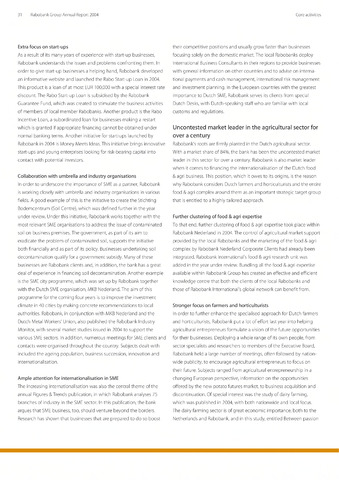Uncontested market leader in the agricultural sector for
over a century
31 Rabobank Group Annual Report 2004
Core activities
Extra focus on start-ups
As a result of its many years of experience with start-up businesses,
Rabobank understands the issues and problems confronting them. In
order to give start-up businesses a helping hand, Rabobank developed
an informative website and launched the Rabo Start-up Loan in 2004.
This product is a loan of at most EUR 100,000 with a special interest rate
discount. The Rabo Start-up Loan is subsidised by the Rabobank
Guarantee Fund, which was created to stimulate the business activities
of members of local member Rabobanks. Another product is the Rabo
Incentive Loan, a subordinated loan for businesses making a restart
which is granted if appropriate financing cannot be obtained under
normal banking terms. Another initiative for start-ups launched by
Rabobank in 2004 is Money Meets Ideas. This initiative brings innovative
start-ups and young enterprises looking for risk-bearing capital into
contact with potential investors.
Collaboration with umbrella and industry organisations
In order to underscore the importance of SME as a partner, Rabobank
is working closely with umbrella and industry organisations in various
fields. A good example of this is the initiative to create the Stichting
Bodemcentrum (Soil Centre), which was defined further in the year
under review. Under this initiative, Rabobank works together with the
most relevant SME organisations to address the issue of contaminated
soil on business premises. The government, as part of its aim to
eradicate the problem of contaminated soil, supports the initiative
both financially and as part of its policy. Businesses undertaking soil
decontamination qualify for a government subsidy. Many of these
businesses are Rabobank clients and, in addition, the bank has a great
deal of experience in financing soil decontamination. Another example
is the SME city programme, which was set up by Rabobank together
with the Dutch SME organisation, MKB Nederland. The aim of this
programme for the coming four years is to improve the investment
climate in 40 cities by making concrete recommendations to local
authorities. Rabobank, in conjunction with MKB Nederland and the
Dutch Metal Workers' Union, also published the Rabobank Industry
Monitor, with several market studies issued in 2004 to support the
various SME sectors. In addition, numerous meetings for SME clients and
contacts were organised throughout the country. Subjects dealt with
included the ageing population, business succession, innovation and
internationalisation.
Ample attention for internationalisation in SME
The increasing internationalisation was also the central theme of the
annual Figures Trends publication, in which Rabobank analyses 75
branches of industry in the SME sector. In this publication, the bank
argues that SME business, too, should venture beyond the borders.
Research has shown that businesses that are prepared to do so boost
their competitive positions and usually grow faster than businesses
focusing solely on the domestic market. The local Rabobanks deploy
International Business Consultants in their regions to provide businesses
with general information on other countries and to advise on interna
tional payments and cash management, international risk management
and investment planning. In the European countries with the greatest
importance to Dutch SME, Rabobank serves its clients from special
Dutch Desks, with Dutch-speaking staff who are familiar with local
customs and regulations.
Rabobank's roots are firmly planted in the Dutch agricultural sector.
With a market share of 84%, the bank has been the uncontested market
leader in this sector for over a century. Rabobank is also market leader
when it comes to financing the internationalisation of the Dutch food
agri business. This position, which it owes to its origins, is the reason
why Rabobank considers Dutch farmers and horticulturists and the entire
food agri complex around them as an important strategic target group
that is entitled to a highly tailored approach.
Further clustering of food agri expertise
To that end, further clustering of food agri expertise took place within
Rabobank Nederland in 2004. The control of agricultural market support
provided by the local Rabobanks and the marketing of the food agri
complex by Rabobank Nederland Corporate Clients had already been
integrated. Rabobank International's food agri research unit was
added in the year under review. Bundling all the food agri expertise
available within Rabobank Group has created an effective and efficient
knowledge centre that both the clients of the local Rabobanks and
those of Rabobank International's global network can benefit from.
Stronger focus on farmers and horticulturists
In order to further enhance the specialised approach for Dutch farmers
and horticulturists, Rabobank put a lot of effort last year into helping
agricultural entrepreneurs formulate a vision of the future opportunities
for their businesses. Deploying a whole range of its own people, from
sector specialists and researchers to members of the Executive Board,
Rabobank held a large number of meetings, often followed by nation
wide publicity, to encourage agricultural entrepreneurs to focus on
their future. Subjects ranged from agricultural entrepreneurship in a
changing European perspective, information on the opportunities
offered by the new potato futures market, to business acquisition and
discontinuation. Of special interest was the study of dairy farming,
which was published in 2004, with both nationwide and local focus.
The dairy farming sector is of great economic importance, both to the
Netherlands and Rabobank, and in this study, entitled Between passion

